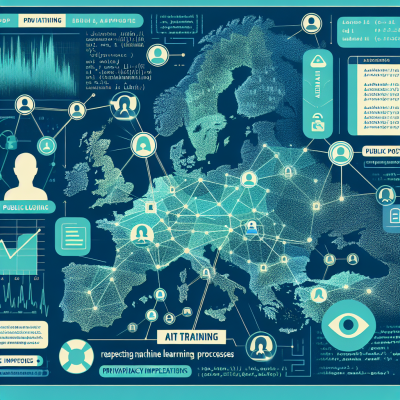
Meta Expands AI Training Strategy in the EU with User Interactions and Public Posts
In a move that’s raising both interest and eyebrows across the tech space, Meta Platforms has announced a significant update to its artificial intelligence (AI) training practices. Starting in 2025, the tech giant will begin using user interactions with its AI and public content shared by adults on its platforms—including Facebook and Instagram—to train its AI models in the European Union.
This shift underscores the broader trend of utilizing massive datasets derived from real-world user behavior to enhance the capabilities of next-generation AI technologies. However, it also brings up important questions about data privacy, transparency, and the ethics of digital consent.
What Does Meta’s New AI Training Policy Mean?
According to Meta, the company will now use:
- User interactions with AI systems: How users engage with AI features — such as chatbots or recommended content — will serve as valuable training data for improving accuracy, responses, and overall user experience.
- Public posts and comments: Only content that is publicly available and shared by adult users across Facebook and Instagram will be used in this training process.
This move is part of Meta’s broader efforts to compete in the AI space against giants like OpenAI, Google, and Microsoft. By leveraging an enormous trove of user-generated data, the company hopes to refine its AI’s understanding of human language, preferences, and cultural nuances across different regions, especially within the diverse European market.
Why the European Market Matters
The decision to apply this AI training protocol in the European Union is significant for two main reasons:
- Regulatory landscape: Europe is known for its stringent data privacy rules, particularly under the General Data Protection Regulation (GDPR). Meta’s choice to start collecting EU data suggests that the company has devised strategies to align with these laws or believes it can navigate potential legal roadblocks.
- User diversity: The EU includes a wide range of languages, cultures, and digital behaviors, making it a goldmine for training AI systems that need to understand context and nuance at a global level.
By incorporating European content, Meta has the potential to build more inclusive, globally relevant AI tools—if it can maintain the public’s trust and operate within legal frameworks.
How Will Meta Use the Data?
Meta’s plan includes feeding this public and AI-interaction data into their machine learning models. These models are used for various services, including:
- Content moderation.
- Product recommendations.
- Automated translations.
- Chatbot responses and virtual agents.
- Augmented and virtual reality features.
Meta says that the goal is to enhance user experience by making AI-driven features more accurate, intelligent, and responsive. For example, a user interacting with Meta’s AI assistant could receive more personalized and culturally aware responses, thanks to the improved contextual understanding derived from real interactions and public content.
Privacy Concerns and Transparency
While Meta has clarified that only adult public content will be used, and not private messages or restricted posts, privacy advocates are likely to scrutinize the move. Given the EU’s strict privacy outlook, Meta will need to ensure it:
- Maintains full compliance with GDPR and upcoming AI-focused regulations.
- Offers transparent opt-out mechanisms for users who do not wish their public data to be used for AI training.
- Clearly communicates what types of content are being collected and how they’re being processed.
The company must walk a fine line between innovation and user rights, especially in a climate where Big Tech companies are under increasing pressure from regulators and watchdog groups.
The Road Ahead: Toward Smarter, More Human-Centric AI
This development is a clear indicator of the next era of AI—one that is deeply entwined with human behavior and language. Meta’s strategy to harness authentic interactions and discourse aims to step beyond training models with curated or artificially generated data. This could result in more natural and human-like AI behaviors, helping bridge the gap between machines and meaningful communication.
However, execution will be key. Any missteps regarding user consent or misuse of public data could spark controversies, fines, and a loss of user trust—especially in the closely monitored European tech arena.
What Should Users Do?
If you’re concerned about your data being used for AI training, here are a few quick takeaways:
- Review your privacy settings on Facebook and Instagram to ensure your posts are set according to your sharing preferences.
- Stay informed about platform updates and Meta’s announcements regarding data usage.
- Watch for opt-out features that may be released in response to regulatory pressure or user demand.
Final Thoughts
Meta’s decision to train its AI using EU-based public interactions and posts marks a bold step toward more globally intelligent machine learning systems. While it’s a technical and strategic win, the real test lies in how the company manages privacy, transparency, and ethical data use. As AI becomes more integrated into our daily digital lives, the balance between innovation and user rights becomes more critical than ever. Stay tuned—and stay informed.


Leave a Reply